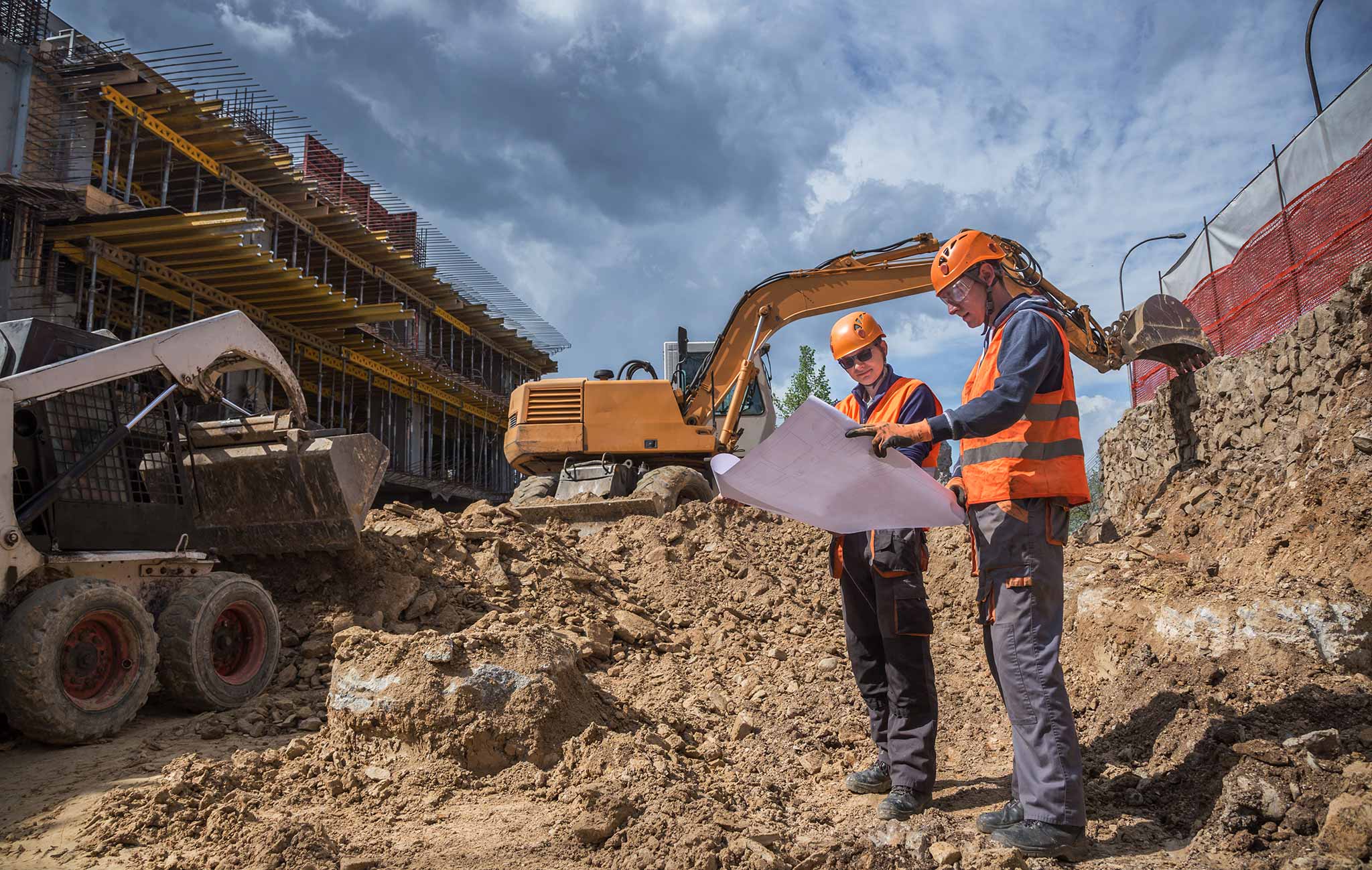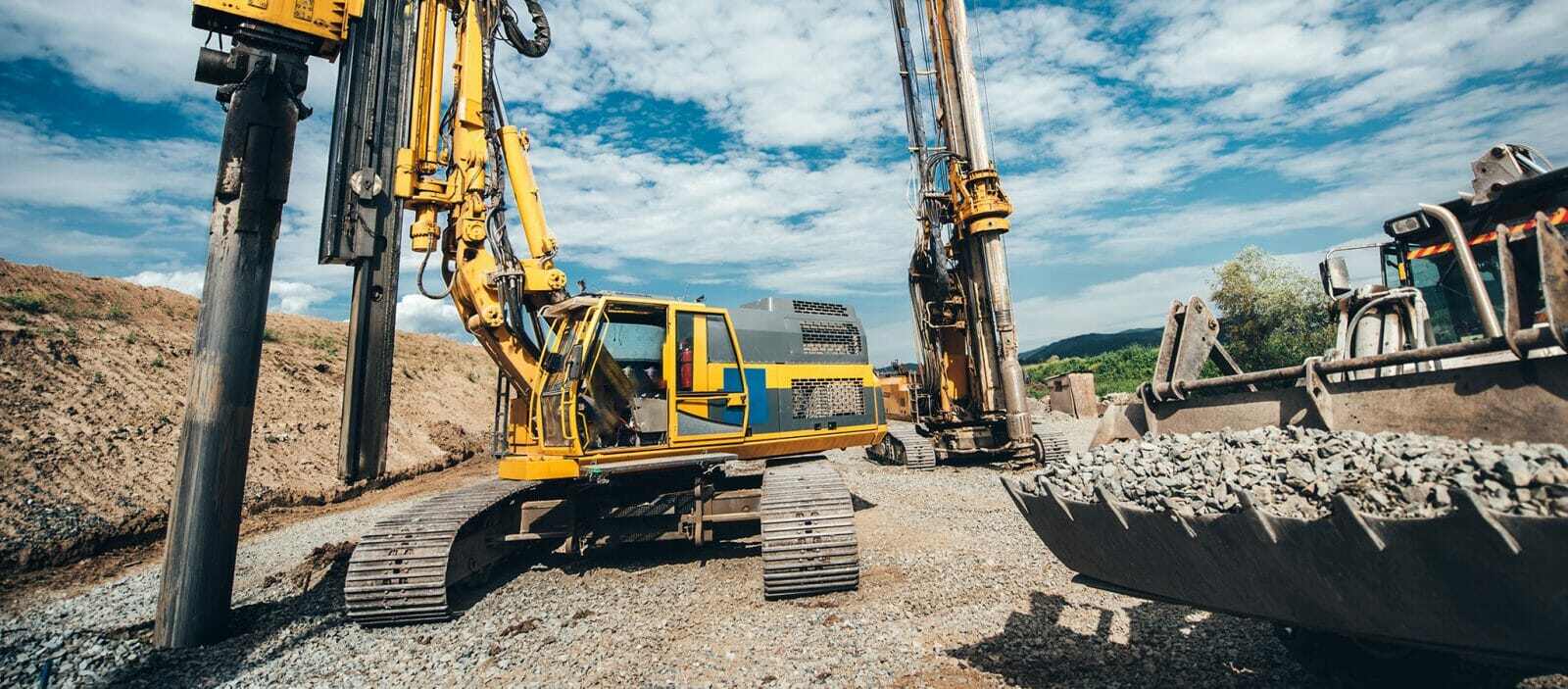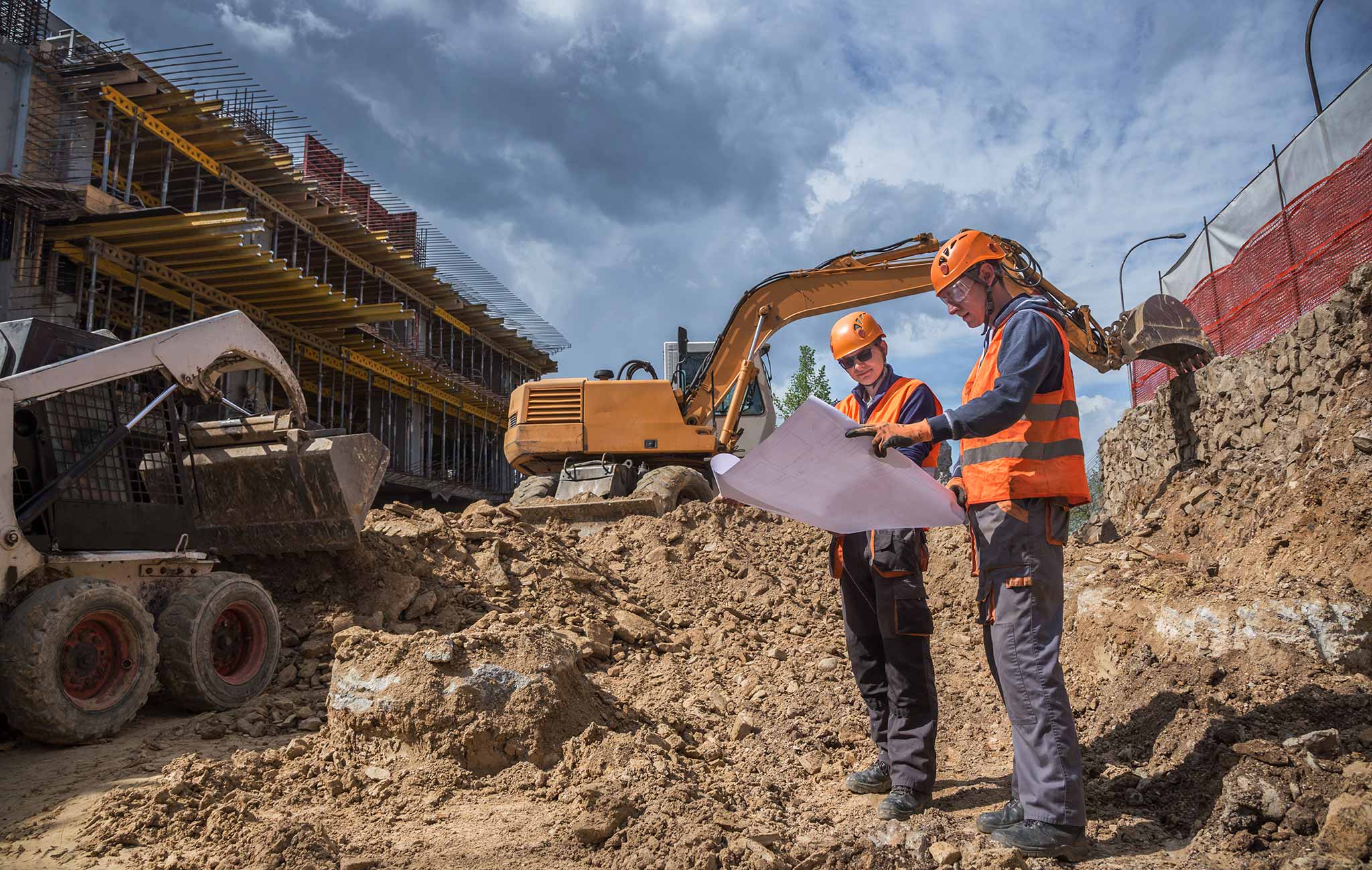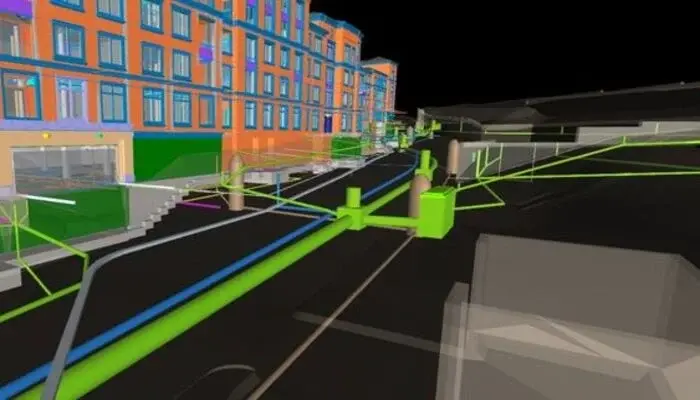
The wide professional spectrum of civil engineering has versatile roles to offer. Thanks to the advancements in material science and technology; numerous fields of work have evolved in recent years. Geotechnical engineering is one such subset of civil engineering that deals with the behaviour and properties of earth materials like soil, rock, and groundwater in relation to their impact on construction projects.
It involves the study of subsurface conditions to design foundations, retaining walls, tunnels, slopes, and other structures that rely on the stability and strength of the ground.
What is Geotechnical Engineering?
.jpg?width=830&height=533&name=Geotechnical%20Engineering%20(1).jpg)
The conventional geotechnical engineering definition focuses on designing, constructing, and maintaining infrastructure and the built environment. It encompasses a range of projects including buildings, roads, bridges, dams, water supply systems, waste management facilities, and tunnels. It aims to improve infrastructure functionality and safety while considering sustainability and resource efficiency.
Types of Geotechnical Engineering
Geotechnical engineering in civil engineering is further subdivided into various realms based on the nature of work and specialisation. Let’s have a closer look at them.
1. Soil and Foundation Engineering
This niche focuses on geotechnical civil engineering- analysing soil properties to design foundations for buildings, bridges, and other structures. An engineer’s work is to ensure the soil can bear the load of the structure without excessive settlement or failure.
Typical salary range: ₹3.5–6 lakhs annually, at the entry-level
2. Rock Mechanics Engineering
Rock mechanics engineers study the nature of rocks under stress, essential for projects like tunnels, dams, and mines. These civil engineers assess rock stability and develop techniques for safe excavation.
Typical salary range: ₹4–7 lakhs annually, for beginners
3. Seismic Engineering
Engineers specialising in structural design lead this niche and create forms to withstand seismic forces. They analyse soil liquefaction scope and ground motion impacts to build earthquake-resistant foundations.
Typical salary range: ₹4–7 lakhs annually, to begin with
4. Landslide Engineering
Earth retention is a key element of geotechnical engineering. This niche delves into the prevention of slope failures, especially in hilly or earthquake-prone regions. The scope of work includes designing retaining walls and slope reinforcements to ensure stability.
Typical salary range: ₹3–5 lakhs annually, for starters
5. Groundwater Engineering
Groundwater impacts soil behaviour and structure stability. Engineers in this field study groundwater flow and design solutions to manage seepage and water-related challenges in construction.
Typical salary range: ₹3.5–6 lakhs annually, for beginner professionals
Also Read: 30 Best Geotechnical Engineering Companies in Worldwide
Top 30 Geotechnical Engineering Project Topics

Having developed a fundamental understanding of geotechnical engineering- civil engineering, below is a list of 20 project topics for you. Researching these subjects will help you develop a better grip on specialised concepts and build your expertise.
1. Soil Stabilization Using Industrial By-products
This project lies at the confluence of civil and geotechnical engineering, exploring materials like fly ash, slag, and rice husk ash to enhance soil properties for road construction. The outcome can include cost-effective and sustainable solutions for improving weak soil conditions in rural India.
2. Seismic Soil Liquefaction Analysis in Indian Earthquake Zones
Focusing on earthquake-prone areas like Gujarat and Uttarakhand, this study can investigate the potential of soil liquefaction during seismic events. The project aims to develop mitigation strategies for safer infrastructure.
3. Slope Stability Analysis of Himalayan Roads
This research assesses the stability of slopes along roads in the Himalayas, prone to landslides due to rainfall and earthquakes. The result of this geotechnical engineering project can include design recommendations for retaining structures to ensure safe transportation.
4. Ground Improvement Techniques for Black Cotton Soil
Black soil typically found in states like Maharashtra and Madhya Pradesh poses a challenge for construction. This project can evaluate methods like lime stabilisation and geotextiles to improve soil-bearing capacity.
5. Use of Geosynthetics in Canal Lining
This project studies the application of geosynthetics to prevent water seepage and improve efficiency in Indian irrigation canals. The outcome focuses on water conservation and reducing maintenance costs.
6. Assessment of Groundwater Recharge Capability in Cities
This research evaluates techniques for increasing groundwater recharge in cities like Bengaluru, where groundwater depletion is severe. It can provide recommendations for rainwater harvesting and aquifer recharge systems.
7. Landslide Mitigation Using Bioengineering Techniques
The scope of this geotechnical engineering project includes vegetation and geotextiles to stabilise slopes. Its report and analysis can highlight sustainable landslide prevention methods.
8. Seepage Analysis for Earth Dams in Semi-Arid Regions
This project studies seepage patterns in dams in Rajasthan and Gujarat, focusing on water loss prevention. The results can provide guidelines for improving dam efficiency and longevity.
9. Dynamic Soil Testing for Metro Rail Projects
This research focuses on dynamic soil properties required for metro projects in cities like Delhi and Mumbai. The end goal can be to share recommendations for designing stable foundations for elevated and underground structures.
10. Geotechnical Solutions for Railway Embankments in Flood-Prone Areas
This project investigates embankment stabilisation methods for railway lines in flood-affected regions. The outcome may include flood-resilient design strategies.

11. Evaluation of Soil Erosion Control Measures in Coastal Areas
This study assesses erosion control techniques for protecting coastal infrastructure. It can recommend sustainable practices like dune stabilisation and seawalls.
12. Use of Bamboo as a Reinforcement Material in Road Construction
Focusing on Northeastern India, this project explores the potential of bamboo for reinforcing weak soils. The study can highlight an affordable and locally available alternative to conventional materials.
13. Geotechnical Challenges in Tunnel Construction in the Western Ghats
This research analyses geological challenges and solutions for tunnel projects in Maharashtra and Karnataka. It may provide insights into rock mechanics and excavation techniques.
14. Soil Contamination Assessment Near Industrial Areas
This project investigates the impact of industrial effluents on soil quality near cities like Surat and Chennai. You can share ideas on remediation techniques for restoring soil health.
15. Ground Improvement for Ports and Harbors
This study emphasises soil stabilization techniques for heavy load-bearing structures. The outcome can ensure improved durability and functionality of port infrastructure.
16. Utilization of Construction and Demolition Waste in Soil Stabilization
This research explores using recycled materials from construction waste to improve soil strength. The study aims to promote sustainability in urban areas like Delhi and Hyderabad.
17. Liquefaction Risk Mapping in Coastal Cities
Zooming the lens on cities like Mumbai, Chennai and Kolkata, this project identifies areas at risk of liquefaction during seismic events. It can develop risk mitigation plans for urban planning.
18. Geotechnical Assessment for Solar Farms in Desert Areas
This research focuses on soil conditions for large-scale solar farms in Rajasthan. You can provide recommendations for anchoring and foundation systems for solar panels.
19. Evaluation of Expansive Soils for Affordable Housing Projects
This project addresses challenges posed by expansive soils in states like Gujarat and Madhya Pradesh. The study suggests cost-effective solutions for low-income housing.
20. Sustainable Solutions for Open Dump Landfill Sites
This research focuses on stabilising and reclaiming landfill sites in metro cities and their satellite counterparts. The outcome includes sustainable methods for converting landfills into usable spaces.

21. Analysis of Geotechnical Properties of Riverbank Soils in Assam
This project investigates riverbank soil erosion in Assam and suggests stabilisation techniques to protect agricultural lands and settlements.
22. Behaviour of Unsaturated Soils in Semi-Arid Regions
This study explores the geotechnical challenges posed by unsaturated soils in states like Rajasthan. It can give insights into soil mechanics and construction techniques.
23. Geotechnical Investigations for Wind Farm Foundations
This project focuses on soil and rock properties required for wind turbine foundations. The research outcome may include efficient foundation designs for wind energy projects.
24. Impact of Quarrying on Soil Stability in Kerala
This is one of the most debatable geotechnical engineering project topics that assesses the effects of quarrying activities on soil stability and slope integrity in Kerala. It can offer suggestions for sustainable quarry management.
25. Design of Earthquake-Resistant Retaining Walls
Focusing on seismic zones like Himachal Pradesh, this project studies retaining wall designs to withstand earthquake forces.
26. Geotechnical Feasibility of Hill Slope Airports
This geotechnical engineering study explores challenges in constructing airports on slopes, such as the Mopa Airport in Goa. It can share input for slope stabilisation and foundation design.
27. Ground Improvement Techniques for Urban Brownfield Sites
This project evaluates soil stabilization methods for redeveloping abandoned industrial sites in cities like Mumbai like the infamous mill sites.
28. Study of Salt-Affected Soils in Coastal Gujarat
This research investigates the geotechnical challenges of salt-affected soils and provides solutions for agricultural and construction purposes.
29. Geotechnical Issues in Smart City Development
With a staunch focus on smart cities like Amaravati, this geotechnical engineering project addresses geotechnical challenges in high-rise construction and urban infrastructure.
30. Use of Nanotechnology in Soil Stabilization
This research investigates the application of nanomaterials to improve soil properties in infrastructure projects across India.
In Conclusion
Geotechnical engineering is one of the most fulfilling and well-paying streams for civil engineers after Btech. As the number of greenfield and brownfield projects increase to support the infrastructure needs of the masses, the demand for such skilled professionals will also witness an upward trend. To become a geotechnical engineer, you must complement your civil and structural engineering knowledge with geotechnical concepts. So, it is ideal to sign up for courses that help you with the necessary knowledge and practical training. By upskilling, you can unlock impressive career opportunities and build a successful career for yourself.
If you are a civil engineer professional who wants to transition to geotechnical engineering as their specialisation, we suggest you explore the BIM Professional Course for Civil Engineers by Novatr. It is a holistic program that offers knowledge about fundamental construction concepts through the use of BIM processes. This helps students develop a tech-first approach towards construction projects. Through capstone projects, learners get an understanding of practical challenges and solutions. Further, Novatr provides placement assistance to aid participants in securing jobs in construction firms globally.
Explore the course today!
Visit our Resources Page to read about the latest developments in the built environment.
Was this content helpful to you










